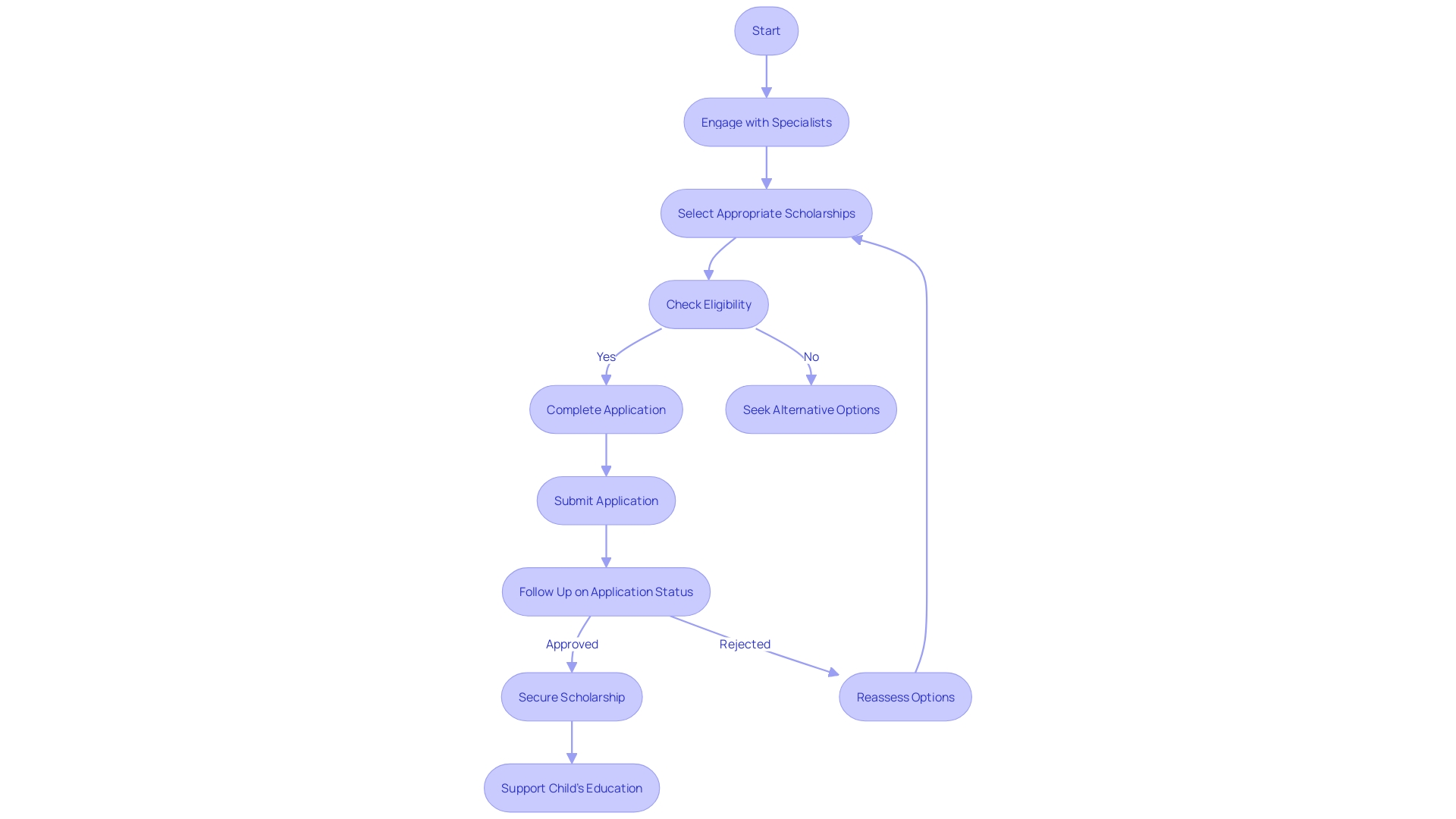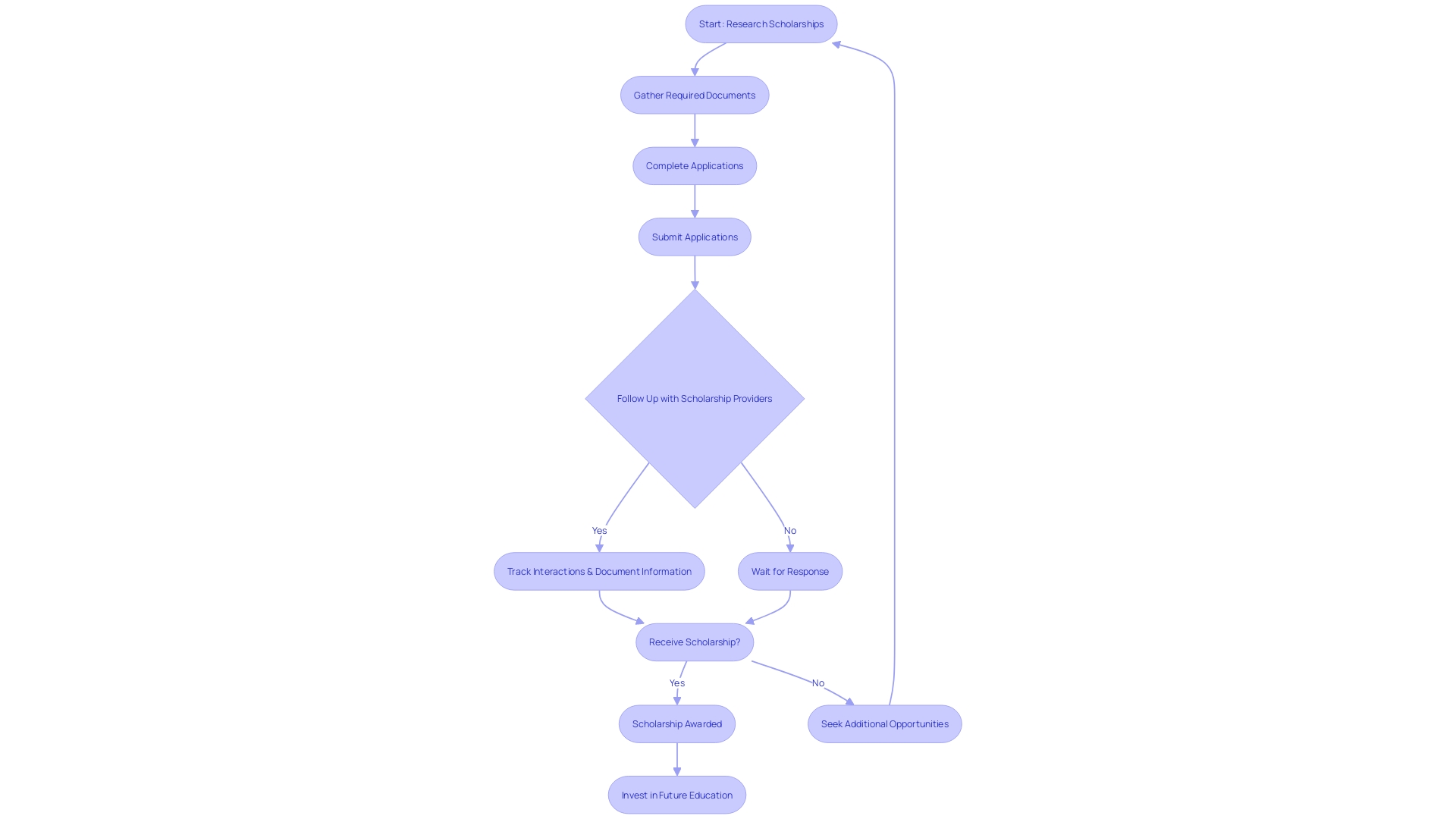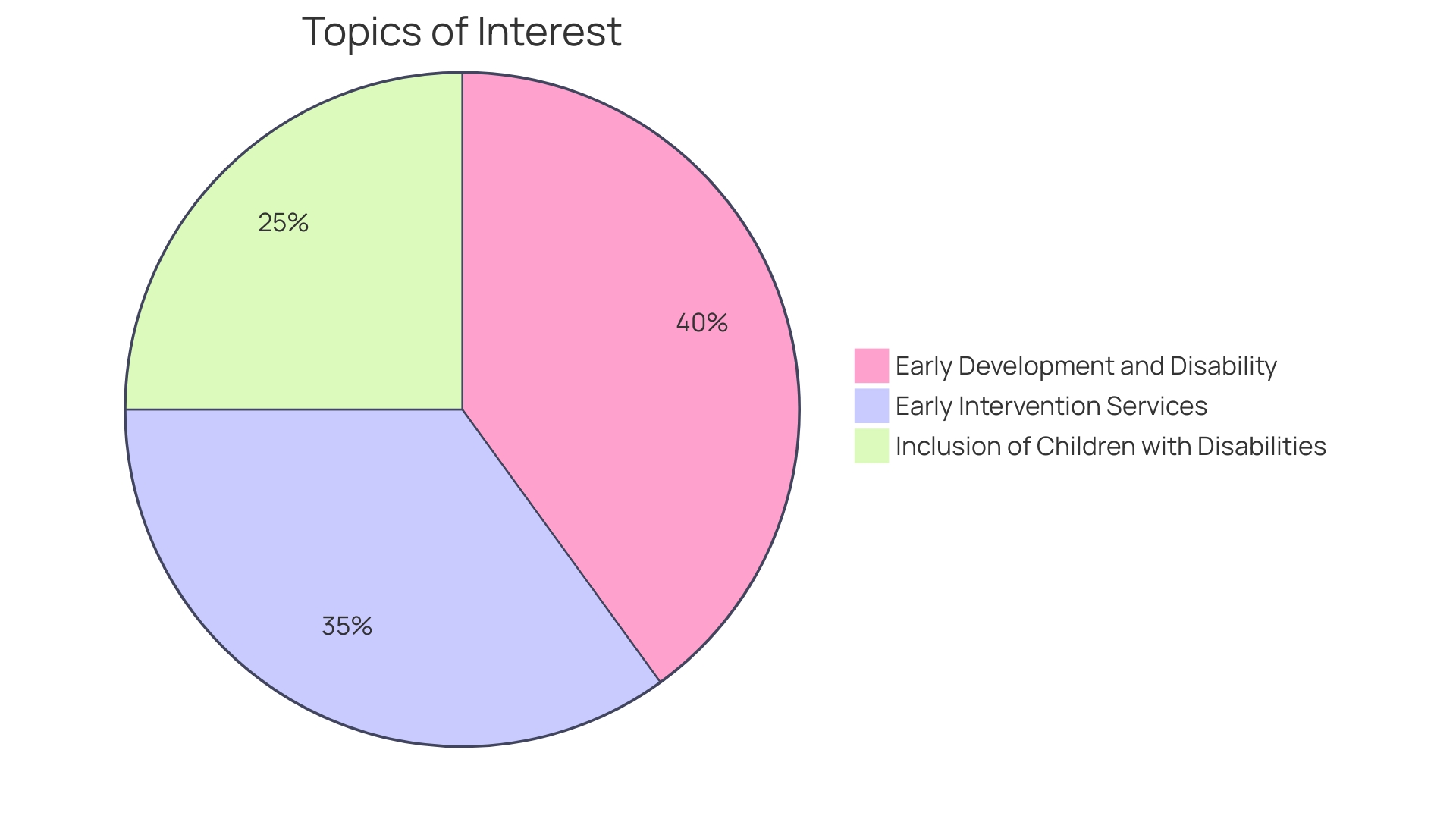Introduction
Scholarships for children with autism offer more than just financial aid; they represent hope and opportunity. These scholarships open doors to essential therapies and educational programs, providing a lifeline for families navigating the complexities of comprehensive care. From initiatives like the Kevin and Avonte Program, which aims to prevent wandering in individuals with autism, to community events like the Autism Speaks Walk, where families find solidarity and support, the autism community is coming together to ensure the well-being of their children.
Parents are also finding invaluable guidance through resources like webinars organized by experts like Laura McKenna, PhD, equipping them with the knowledge to make informed decisions about their child's future. Inclusive employment practices that embrace neurodiversity are also proving to be economically beneficial, highlighting the valuable contributions of individuals with disabilities to the workforce and the overall economy. As the reauthorization of the Autism CARES Act approaches, it is crucial to secure funding for existing programs and broaden our scope to meet the evolving demands of the autism community.
The collective efforts of parents, educators, researchers, and advocates are creating a more inclusive world where the full potential of individuals with autism can be realized.
Understanding Autism Scholarships
Scholarships for children with autism open doors to essential therapies and educational programs, providing a lifeline for families navigating the financial complexities of comprehensive care. These scholarships are more than just monetary awards; they represent hope and opportunity. For instance, the Kevin and Avonte Program, named after two autistic teens who tragically lost their lives, has allocated over $10.3 million since 2018 to various initiatives aimed at preventing wandering, a common and dangerous behavior in individuals with autism. This kind of targeted funding supports local efforts in public awareness, education, and recovery strategies, highlighting the critical role that scholarships and grants play in safeguarding the autism community.
In the same vein, the Autism Speaks Walk exemplifies a community coming together to raise funds that underpin transformative research and services. With these events, individuals with autism, alongside their families and friends, find solidarity and support in their shared journey. The provision of quiet spaces at these walks acknowledges and accommodates the sensory challenges faced by many, ensuring an inclusive environment for all participants.
In addition to direct financial support, parents are finding invaluable guidance through initiatives like the webinar series organized by Laura McKenna, PhD, of McKenna Connections. With her extensive background in education and personal experience as a mother of a young man with autism, Dr. McKenna's webinars offer a unique and much-needed resource for parents seeking the best programs for their children. These sessions, often inaccessible through traditional channels like high school guidance counselors, equip parents with the knowledge to make informed decisions about their child's future.
Amidst these efforts, economic analyses reveal an encouraging trend: inclusive employment practices that embrace neurodiversity are not only ethically sound but also economically beneficial. Companies that actively employ individuals with disabilities often see higher revenues and profit margins, with an estimated potential to boost the U.S. GDP by up to $25 billion. This underscores the valuable contributions that people with disabilities bring to the workforce and the overall economy.
As we look towards the future of autism advocacy, it is imperative to continue these conversations and actions that address the needs of those with severe challenges. With the impending reauthorization of the Autism CARES Act, there is a pressing need to secure funding for existing programs while broadening our scope to meet the evolving demands of the autism community. The collective efforts of parents, educators, researchers, and advocates are creating a more inclusive world where the full potential of individuals with autism can be realized.
Researching Available Scholarships
For parents navigating the complex world of autism, uncovering financial support can be a game-changer, especially when it comes to educational resources. Autistic children often require specialized programs that cater to their unique learning styles and abilities. Seeking out autism-specific scholarships can lead to opportunities that might otherwise go unnoticed. Organizations, foundations, and institutions are increasingly recognizing the diverse talents of autistic students, particularly those who are "twice exceptional," excelling in areas such as math, science, or the arts. These scholarships are not merely financial aids; they are investments in the potential of these young minds.
Laura McKenna, PhD, at McKenna Connections, underscores the value of staying informed about the best programs available. Through regular webinars, parents gain the latest insights and can directly inquire about educational paths suited to their child's strengths. High school counselors may not always be aware of these specialized scholarships, which highlights the importance of parents doing their own research to find the best fit for their child.
Ann Marie, with her background in economics and storytelling, emphasizes the importance of understanding the intersection of public policy and personal choices. Similarly, parents must navigate the intricacies of educational policies and scholarship criteria to secure the best options for their children.
The reality is that approximately 1 in 100 students in American schools is autistic, with a subset possessing exceptional academic talents. Research involving twice-exceptional autistic college students reveals that early identification of appropriate support can significantly enhance their transition to and success in college. Parents, therefore, play a critical role in researching and identifying scholarships that recognize and foster their child's exceptional abilities.
In an ever-evolving landscape of treatments and educational methods, it's crucial for parents to remain current with new developments. This proactive approach is not only beneficial in managing a child's healthcare but also in exploring the latest educational resources and financial support systems. Autistic individuals are increasingly being acknowledged as integral members of society, and their inclusion in diversity and equity conversations is paramount, especially in educational settings.
By delving into the resources available, parents can ensure that their child receives the support they need to thrive academically. It's a journey that requires diligence, but the rewards—seeing a child's capabilities recognized and nurtured through scholarship opportunities—are immeasurable.
Preparing a Strong Application
Successfully securing autism scholarships can significantly impact a child’s educational journey, especially for those with unique strengths and challenges. Crafting a scholarship application requires careful attention to detail and an understanding of what sets each program apart. Parents can draw on the expertise of experienced educators like Laura McKenna of McKenna Connections, who provides valuable insights through webinars on the best educational programs for students with autism.
When gathering documentation, it’s essential to include comprehensive medical records, evaluations, and financial statements that paint a full picture of the child's needs and circumstances. A compelling personal statement can make all the difference. It should not only reflect the child's individuality but also articulate the transformative potential of the scholarship. This approach aligns with the ethos of programs like the Kevin and Avonte Program, which honors the memory of two autistic teens and aims to safeguard individuals with developmental disabilities.
Reflecting on the effectiveness and impact of such initiatives, it’s clear that tailored programs and educational opportunities can greatly enhance the lives of children with autism. As noted by experts in educational policy and research, such as Ann Marie at EdChoice, the intersection of public policy and individuals’ lives is crucial. This perspective is supported by the substantial funding directed toward autism research and services, reinforcing the importance of informed and thoughtful applications for scholarships and grants.
In conclusion, the dedication parents pour into the scholarship application process—backed by accurate information and strategic guidance—can open doors to invaluable educational resources, ultimately fostering a more supportive and enabling environment for their children.
Exploring Funding Opportunities
Exploring various financial options is crucial for parents seeking resources to support their children with autism. ABLE accounts stand out as a valuable tool, offering tax advantages for families saving for disability-related expenses. These accounts are designed to provide a secure financial future without compromising eligibility for essential public benefits. Alongside ABLE accounts, there are specialized grants from both government initiatives and private organizations aimed at easing the financial burden. These grants can be pivotal, especially in light of the alarming statistics that indicate a significant number of autistic children face extensive waits for health and educational support. For example, the Kevin and Avonte Program, established to prevent wandering incidents, has allocated over $10 million to community efforts that enhance safety for individuals with developmental disabilities. Moreover, nonprofit organizations are keen to fund services that fill gaps in the system, focusing on early intervention and post-treatment support. It is through such combined efforts and resources that parents can secure the necessary therapy and educational aids to foster their children's development and well-being.
Utilizing Professional Guidance and Support
Parents navigating the complex terrain of autism scholarships can significantly enhance their journey by engaging with specialists who understand the nuances of autism advocacy and education. These professionals can illuminate the path toward securing financial support for education, offering tailored advice on selecting the most appropriate scholarships, ensuring applications shine with potential, and championing the unique educational needs of the child. Collaborating with such experts can demystify the application process, empowering parents to advocate effectively for their child's educational future, in alignment with the evolving perception of autism within society and legislation.

Maintaining Documentation and Follow-Up
As parents embark on the journey of supporting their child's educational aspirations, particularly when it involves applying for scholarships, attention to detail is paramount. After submitting a scholarship application, it's not merely a waiting game. Instead, it's a phase of meticulous documentation and engagement. Keeping a detailed record of all submissions is crucial, as it ensures you have proof of your application and can refer back to any information if needed. This includes a systematic logging of interactions with the scholarship providers. By understanding the timeline and actively participating in the decision-making process, you set the stage for a better outcome.
To illustrate the significance of staying informed and proactive, consider the case study involving a student whose dream of solving technical community problems through engineering was fueled by early passion and the encouragement of a supportive high school teacher. This narrative underscores the importance of nurturing educational goals with a hands-on approach. Similarly, the principles of honesty, accountability, courtesy, and good stewardship of research resonate with the scholarship application process. These principles not only apply to the academic world but also to the way parents and students should manage scholarship applications.
News reports, such as the ones highlighting the challenges of accessibility jobs in the UK, emphasize the pitfalls of not being supported. This parallels the need for parents to ensure they don't let their scholarship applications go unsupported. Staying on top of the process can prevent the feeling of being overwhelmed and increases the likelihood of success.
Moreover, statistics about the types of support parents provide—ranging from financial aid for housing and phones to covering basic necessities—reveal the breadth of parents' involvement in their children's lives. Being proactive in scholarship applications is an extension of this support, potentially easing the financial burdens.
Quotes from experts about assessing evidence and understanding the research style offer a valuable perspective for parents. They suggest that by being engaged and discerning, one can navigate complex processes more effectively. It's a reminder that the approach to managing scholarship applications should be informed and strategic, mirroring the diligence required in scientific research.
By embracing these practices, parents can not only maximize the chances of scholarship success for their children but also model the proactive, informed approach that will serve them well in all their academic endeavors.

Success Stories of Autism Scholarships
Success stories like James's, who discovered his passion for art through the support he received after being diagnosed with autism, exemplify the transformative power of targeted assistance. James's journey from feeling isolated in secondary school to hosting his first art exhibition reveals the profound impact that individualized communication methods, such as the Picture Exchange Communication System (PECS), and educational support can have on a child's development. Moreover, initiatives like the Kevin and Avonte Program highlight the importance of proactive community efforts and educational programs in enhancing the safety and well-being of children with autism. By awarding $10.3 million to 77 grant recipients since 2018, this program has taken significant strides in preventing wandering and elopement, which pose serious risks to children with developmental disabilities. These narratives not only provide a beacon of hope for parents navigating autism scholarships and resources but also underscore the critical role of personalized education and community support in fostering the growth and success of children with autism.

Tips for Maximizing Autism Scholarships
Parents eager to obtain autism scholarships for their children's education can harness effective strategies to enhance their chances of success. Initiating the search early allows ample time to uncover various scholarship opportunities, each with its unique set of eligibility criteria. Diligently gathering necessary documents and crafting a compelling personal statement can significantly strengthen an application. Additionally, parents are encouraged to explore various funding avenues and seek professional advice for a comprehensive approach. Keeping meticulous records and persistently following up with scholarship programs is crucial. Stories of success serve not only as motivation but also as a blueprint for the kind of detailed, dedicated approach that yields results. By employing these tactics, parents can provide their children with the essential resources and support for their educational journey.
Conclusion
Scholarships for children with autism offer hope and opportunity through essential therapies and educational programs. The Kevin and Avonte Program and community events like the Autism Speaks Walk demonstrate the collective efforts of the autism community to ensure the well-being of their children. Parents can access invaluable guidance through webinars organized by experts like Laura McKenna, PhD, empowering them to make informed decisions about their child's future.
Inclusive employment practices that embrace neurodiversity benefit individuals with disabilities and contribute to the overall economy. Securing funding for existing programs and meeting the evolving demands of the autism community is crucial as the reauthorization of the Autism CARES Act approaches.
For parents navigating the complex world of autism, seeking out autism-specific scholarships can be a game-changer, providing opportunities that might otherwise go unnoticed. Laura McKenna, PhD, and other experts offer valuable insights through webinars, empowering parents to find the best programs for their children.
Crafting a strong scholarship application requires attention to detail and an understanding of what sets each program apart. Engaging with specialists who understand autism advocacy and education can enhance the journey of navigating autism scholarships.
Exploring financial options like ABLE accounts and specialized grants is crucial for parents seeking resources to support their children with autism. These options alleviate the financial burden and provide necessary therapy and educational aids.
Maintaining documentation and following up after submitting scholarship applications is essential. Being proactive and informed throughout the process maximizes the chances of success for children with autism.
Success stories highlight the transformative power of targeted assistance and personalized education. These stories underscore the critical role of individualized communication methods, community support, and educational programs in fostering the growth and success of children with autism.
Parents can maximize their chances of success by initiating the search early, gathering necessary documents, crafting a compelling personal statement, exploring funding avenues, seeking professional advice, and persistently following up with scholarship programs.
By embracing these strategies, parents can provide their children with the essential resources and support for their educational journey.
Discover autism-specific scholarships that can be a game-changer for your child's future.




